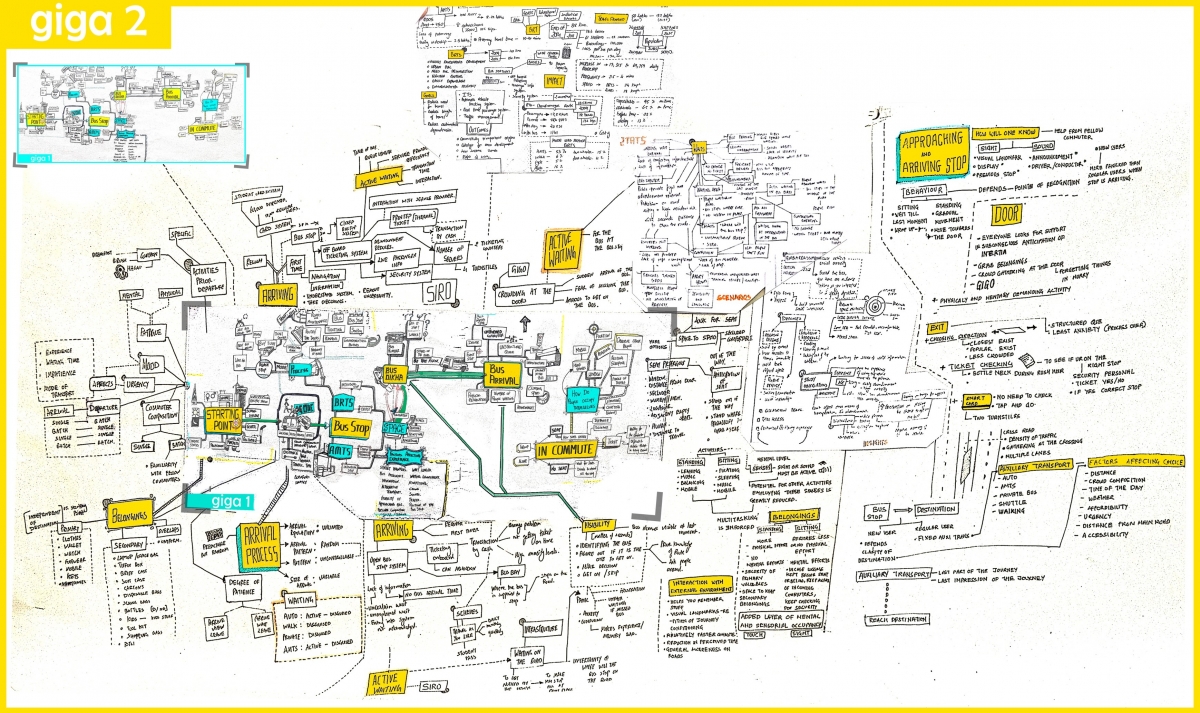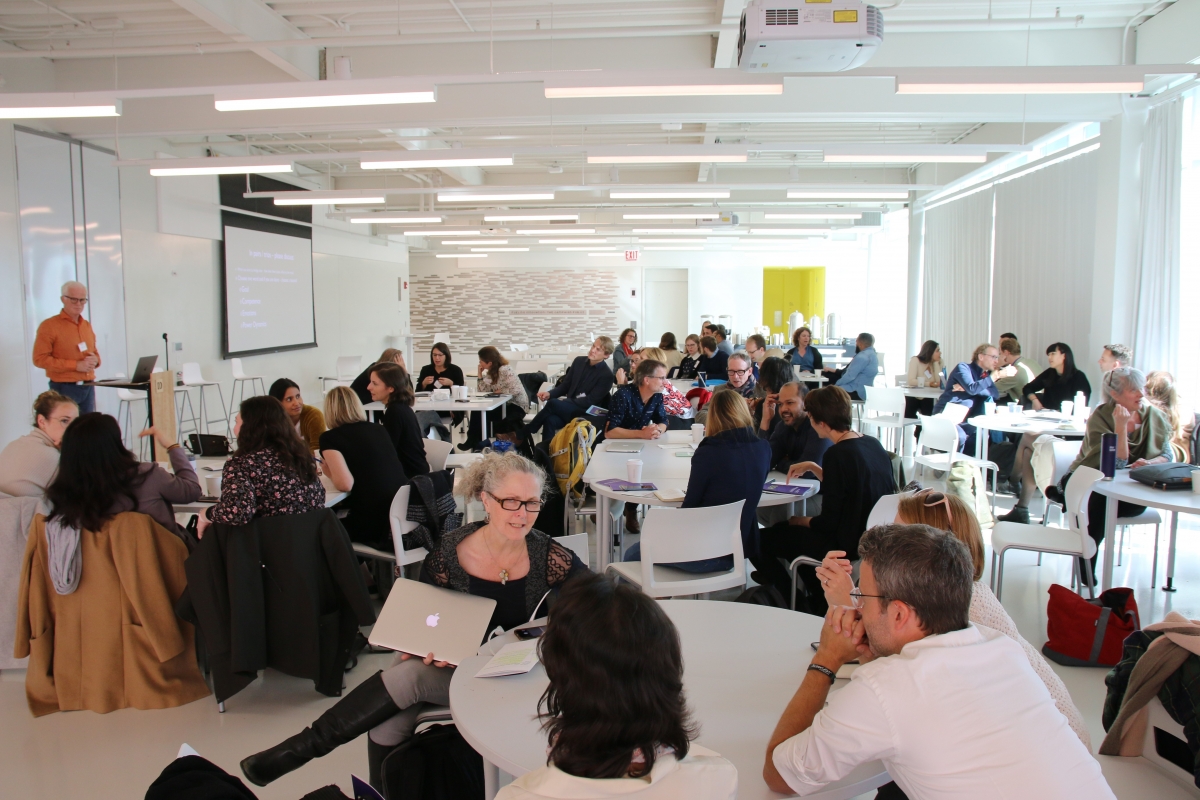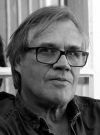Executive Master of Systems Oriented Design
The Executive Master of Systems Oriented Design is a part-time programme with intensive seminars. The programme comprises 90 credits (ECTS) over three years, corresponding to 50% of a full-time study. The programme consists of 8 independent courses (modules) taken over the course of two years. The third and final year is dedicated to the master’s thesis (module 9).
Most courses comprise 2 seminars over the course of three days each. Every other seminar is digital to reduce the need for travel. Attendance is mandatory. The seminars consist of lectures, group work, and discussions. In addition to the seminars, each course includes self-study and required reading, and concludes with a project assignment. The programme demands significant self-effort but is organised to be compatible with full-time employment.

Photo: Hrishikesh Kogje, Parashar Agravat, Rahul Agarwal and Shailendra Jadega Project Guide: Praveen Nahar, NID India (2014)

From RSD8, IIT, Chicago 2019 (Photo Palak Dudani)
 Andreas Wettre is an engineer with a master’s in business and leadership and experience with leadership within technical companies and consultancies. Since 2004, Andreas has worked as a consultant in the development of management teams and applies systemic thinking and systems oriented design in this context. Andreas has been affiliated with AHO and the Institute of Design since 2011, an engagement that has gradually increased to a full-time commitment. Andreas contributes with expertise in implementation, team and organizational understanding, in addition to a deep and broad understanding of business.
Andreas Wettre is an engineer with a master’s in business and leadership and experience with leadership within technical companies and consultancies. Since 2004, Andreas has worked as a consultant in the development of management teams and applies systemic thinking and systems oriented design in this context. Andreas has been affiliated with AHO and the Institute of Design since 2011, an engagement that has gradually increased to a full-time commitment. Andreas contributes with expertise in implementation, team and organizational understanding, in addition to a deep and broad understanding of business.
 Jonathan Romm is a trained industrial designer specializing in design management. Romm has broad experience within product, interaction, service, and management design. He is also an engaged partner, design specialist, and consultant at the Norwegian design agency, Halogen. He has previously held the positions as Head of Institute of Design and Vice-Rector at AHO. Over the past few years, he has contributed to both academic and popular publications related to several innovative, interdisciplinary, and systemic design and research projects.
Jonathan Romm is a trained industrial designer specializing in design management. Romm has broad experience within product, interaction, service, and management design. He is also an engaged partner, design specialist, and consultant at the Norwegian design agency, Halogen. He has previously held the positions as Head of Institute of Design and Vice-Rector at AHO. Over the past few years, he has contributed to both academic and popular publications related to several innovative, interdisciplinary, and systemic design and research projects.
 Birger Sevaldson is an interior architect and furniture designer with experience spanning from architecture to industrial design. Birger has a PhD in digital creativity and conducts research on the development of design processes to meet the continuously growing need for complexity caused by increasing globalisation and sustainability demands. He introduced systems oriented design as a practice that is developed through research by design. Visit his website here (systemsorienteddesign.net).
Birger Sevaldson is an interior architect and furniture designer with experience spanning from architecture to industrial design. Birger has a PhD in digital creativity and conducts research on the development of design processes to meet the continuously growing need for complexity caused by increasing globalisation and sustainability demands. He introduced systems oriented design as a practice that is developed through research by design. Visit his website here (systemsorienteddesign.net).
AHO is a well-renowned international school with a world-leading SOD environment that is highly respected in academic contexts worldwide. Through the Systemic Design Association, the school is actively involved in research in SOD environments in Zurich, Delft and Turin, as well as in India, China, Australia, Canada and the USA.
AHO has an open, diverse, creative and rich student environment formed by different voices and approaches. We are not looking for one way to think, but many ways to explore the world.
Most courses comprise 2 seminars over the course of three days each. Every other seminar is digital to reduce the need for travel. Attendance is mandatory. The seminars consist of lectures, group work, and discussions. In addition to the seminars, each course includes self-study and required reading, and concludes with a project assignment. The programme demands significant self-effort but is organised to be compatible with full-time employment.
Excursions
One of the modules is a study trip to the annual RSD (Relating Systems Thinking & Design) conference. This is the most important SOD conference, at which practitioners from all over the world meet, listen and discuss a good mix of complex societal and organisational interventions and the development of SOD methods and theories. The trip expenses are paid by the students and are in addition to the tuition fee.

Photo: Hrishikesh Kogje, Parashar Agravat, Rahul Agarwal and Shailendra Jadega Project Guide: Praveen Nahar, NID India (2014)

From RSD8, IIT, Chicago 2019 (Photo Palak Dudani)
Teaching
The Institute of Design at AHO is academically responsible for this experience-based master’s programme, and SOD students interact with the academic community at the institute. In addition, The Executive Master of Systems Oriented Design is closely connected to academic networks in research, teaching, and practice – both nationally and internationally. A range of external environments also contribute to the programme. The principal teaching contributors are: Andreas Wettre is an engineer with a master’s in business and leadership and experience with leadership within technical companies and consultancies. Since 2004, Andreas has worked as a consultant in the development of management teams and applies systemic thinking and systems oriented design in this context. Andreas has been affiliated with AHO and the Institute of Design since 2011, an engagement that has gradually increased to a full-time commitment. Andreas contributes with expertise in implementation, team and organizational understanding, in addition to a deep and broad understanding of business.
Andreas Wettre is an engineer with a master’s in business and leadership and experience with leadership within technical companies and consultancies. Since 2004, Andreas has worked as a consultant in the development of management teams and applies systemic thinking and systems oriented design in this context. Andreas has been affiliated with AHO and the Institute of Design since 2011, an engagement that has gradually increased to a full-time commitment. Andreas contributes with expertise in implementation, team and organizational understanding, in addition to a deep and broad understanding of business. Jonathan Romm is a trained industrial designer specializing in design management. Romm has broad experience within product, interaction, service, and management design. He is also an engaged partner, design specialist, and consultant at the Norwegian design agency, Halogen. He has previously held the positions as Head of Institute of Design and Vice-Rector at AHO. Over the past few years, he has contributed to both academic and popular publications related to several innovative, interdisciplinary, and systemic design and research projects.
Jonathan Romm is a trained industrial designer specializing in design management. Romm has broad experience within product, interaction, service, and management design. He is also an engaged partner, design specialist, and consultant at the Norwegian design agency, Halogen. He has previously held the positions as Head of Institute of Design and Vice-Rector at AHO. Over the past few years, he has contributed to both academic and popular publications related to several innovative, interdisciplinary, and systemic design and research projects. Birger Sevaldson is an interior architect and furniture designer with experience spanning from architecture to industrial design. Birger has a PhD in digital creativity and conducts research on the development of design processes to meet the continuously growing need for complexity caused by increasing globalisation and sustainability demands. He introduced systems oriented design as a practice that is developed through research by design. Visit his website here (systemsorienteddesign.net).
Birger Sevaldson is an interior architect and furniture designer with experience spanning from architecture to industrial design. Birger has a PhD in digital creativity and conducts research on the development of design processes to meet the continuously growing need for complexity caused by increasing globalisation and sustainability demands. He introduced systems oriented design as a practice that is developed through research by design. Visit his website here (systemsorienteddesign.net).
Reading list
Each module has a syllabus and a list of recommended reading. The student is expected to read the module’s literature prior to the seminar. Articles and compendia will be published on AHO’s learning platform over the course of the programme. Additionally, students will be responsible for buying a small selection of textbooks. The seminars will not be a review of the syllabus, but they should be regarded as part of the syllabus.Systems oriented design at AHO
Systems oriented design (SOD) is a way of thinking, but it is also a methodology for visualising complex issues. It is thus a valuable method and skill for understanding, communicating and finding smart interventions that help us to develop better organisations and society.AHO is a well-renowned international school with a world-leading SOD environment that is highly respected in academic contexts worldwide. Through the Systemic Design Association, the school is actively involved in research in SOD environments in Zurich, Delft and Turin, as well as in India, China, Australia, Canada and the USA.
AHO has an open, diverse, creative and rich student environment formed by different voices and approaches. We are not looking for one way to think, but many ways to explore the world.